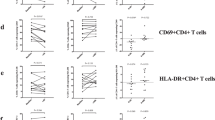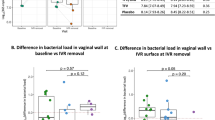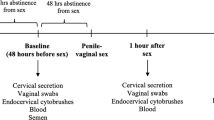Abstract
THE accepted criterion of response in the intra-vaginal Allen–Doisy assay is cornification of the vaginal epithelium, which occurs 48–54 hr. after administration of an effective dose of œstrogen1,2. Cornification is the end-point of a lengthy chain of events involving cell multiplication and growth of the epithelium.
This is a preview of subscription content, access via your institution
Access options
Subscribe to this journal
Receive 51 print issues and online access
$199.00 per year
only $3.90 per issue
Buy this article
- Purchase on Springer Link
- Instant access to full article PDF
Prices may be subject to local taxes which are calculated during checkout
Similar content being viewed by others
References
Allen, E., and Doisy, E. A., Physiol. Rev., 7, 600 (1927).
Emmens, C. W., “Hormone Assay”, Chap. 13 (Academic Press, New York, 1950).
Biggers, J. D., and Claringbold, P. J., J. Anat., 89, 124 (1955).
Biggers, J. D., and Claringbold, P. J., Aust. J. Biol. Sci., 7, 118 (1954).
Biggers, J. D., J. Endocrinol., 7, 163 (1951).
Author information
Authors and Affiliations
Rights and permissions
About this article
Cite this article
MARTIN, L., CLARINGBOLD, P. A Highly Sensitive Assay for Œstrogens. Nature 181, 620–621 (1958). https://doi.org/10.1038/181620b0
Issue Date:
DOI: https://doi.org/10.1038/181620b0
Comments
By submitting a comment you agree to abide by our Terms and Community Guidelines. If you find something abusive or that does not comply with our terms or guidelines please flag it as inappropriate.



